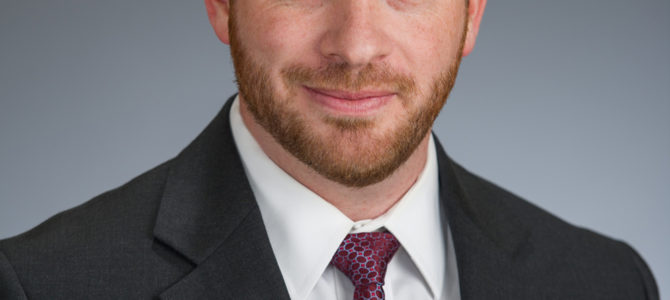
Ryan Williams will become president of the Claremont Institute, succeeding Michael Pack, the likely nominee to head the Broadcasting Board of Governors.
The California-based Claremont Institute trains conservative leaders in the principles of the American founding and publishes the Claremont Review of Books, a quarterly journal of political thought and statesmanship. The Board of Directors chose Williams, who has served as the organization’s chief operating officer for the last four years, as its next leader, beginning September 1.
“Ryan is a scholar and a proven leader whose deep understanding of the principles of the American Founding and dedication to Claremont’s mission make him uniquely qualified to lead the Institute at a time when uncertainty within the conservative movement has given Claremont a particularly influential role in the national debate,” said Chairman of the Board Thomas Klingenstein in a statement.
Williams received his B.A. in political science and economics from Hillsdale College, and an M.A. in politics from Claremont Graduate University. He studied under Claremont scholars Harry Jaffa, Charles Kesler, and Larry Arnn; was a 2004 Publius Fellow at the institute; and is a contributor to the Claremont Review of Books. As such, Williams is the first president of the institute whose formation represents the fulfilling of Claremont’s mission.
“It is a great honor to lead The Claremont Institute. I have devoted my academic and professional life to advancing its mission,” said Williams in a statement. “The principles of the Declaration of Independence and the American Founding remain as true, beautiful, and necessary as ever. Our new political landscape provides a rare opportunity to recover those principles—in particular, to help dismantle the administrative state, recover constitutionalism, and reestablish a foreign policy committed to the security of the American people.”
Claremont was founded in 1979 and reached prominence under the leadership of past president Arnn, now Hillsdale College’s president, from 1985 to 2000. But it was the institute’s ability to host thoughtful and provocative debates during the rise of the candidacy of Donald Trump that led many to take notice. The New Yorker profiled the organization in January, noting the group’s intellectual support for conservatism under Trump, a president who disdains ideology. The New York Times profiled the organization in February.
Both profiles arose after the Claremont Review of Book’s web site, under the leadership of editor Charles Kesler, featured vigorous disputes on Trump. These included strong critiques, cautious analyses, and vigorous defenses of voting for Trump, such as “The Flight 93 Election.” That essay, which compared voting for Trump to fighting for control of the cockpit on a hijacked airplane, was arguably the most debated and influential piece of rhetoric from the campaign.
At a time when many conservative organizations and media outlets struggled to understand and react to Trump’s candidacy and surprise victory, Claremont managed to incorporate both the concerns and optimism of the 2016 election.
“Our mission remains what it always has been: recovering the principles of the founding and restoring them to their rightful, preeminent authority in our national life. A slate of policy options had seemingly morphed into Republican Party or conservative movement principles. For those of us with a longer view, it was easier to look at the moment with fresh eyes, especially the phenomenon of [Trump’s] support,” said Williams in an interview.
The institute’s most important work has been its summer seminars, where students are immersed in study of The Federalist Papers and other founding literature. The group is known for its focus on the Declaration of Independence, and the idea that “all men are created equal and are endowed by their Creator with certain unalienable rights.”
Its Publius Fellowship is for highly qualified college seniors or recent college graduates and graduate students pursuing careers in politics, scholarship, journalism, and related fields. The Lincoln Fellowship, which focuses on the statesmanship of President Lincoln, is for young professionals, including employees of the federal and state governments, public policy research institutions, and print and broadcast media. Its John Marshall Fellowship is for prospective clerks and legal scholars.
Like much of the conservative movement, the more than 600 alumni who have gone through these programs have differing views on the meaning of Trump’s rise and the role of conservative policy in advancing the principles of the American founding.
Williams sees more similarities than differences in the alumni, some 250 of whom are currently energetically engaged in these fields, mostly in Washington DC, and New York. “We’re all keenly aware of the fragility of this experiment in self-government and we’re all passionate and driven about trying to save it and ensure that this continues to be a regime of liberty and self-government,” said Williams, who will be Claremont’s sixth president.
The board’s selection of Williams was unanimous. Vice Chair Arnn said, “Ryan is the right man to continue and expand the vital services of the institute in these grave and promising times.”
Pack’s imminent departure was announced last week. He will continue as a non-resident senior fellow of the institute and begin production, in conjunction with Claremont, of a documentary on Supreme Court Justice Clarence Thomas’s rise from poverty in the segregated South to the nation’s highest court. Pack oversaw the rise of the institute’s profile and relevance, including the launch of a Washington DC office and the digital edition of the Claremont Review of Books.









